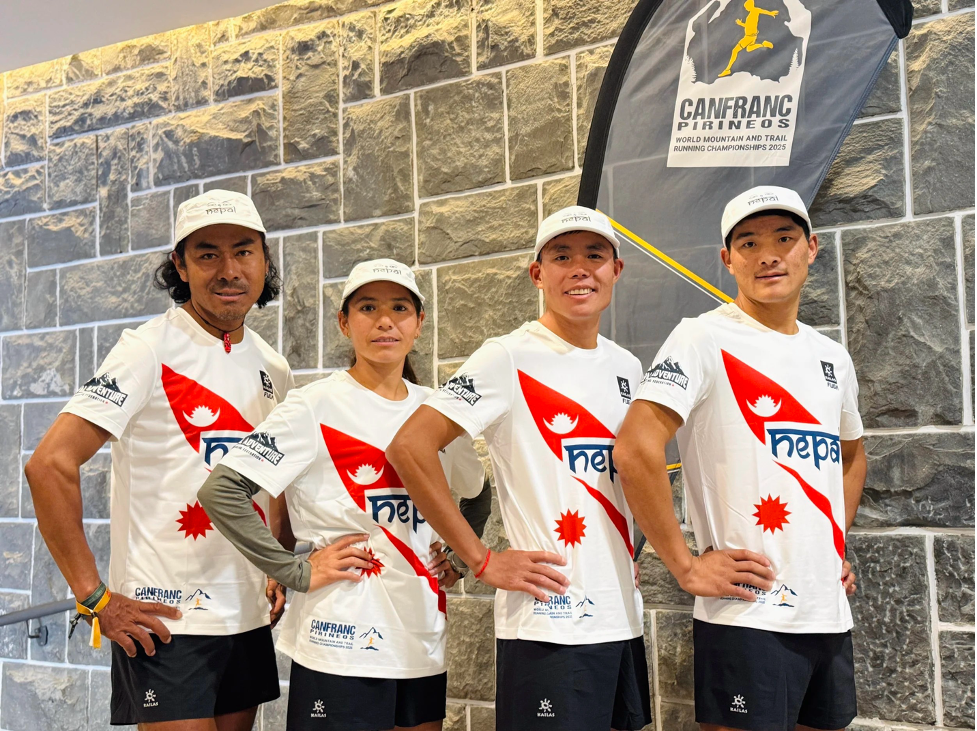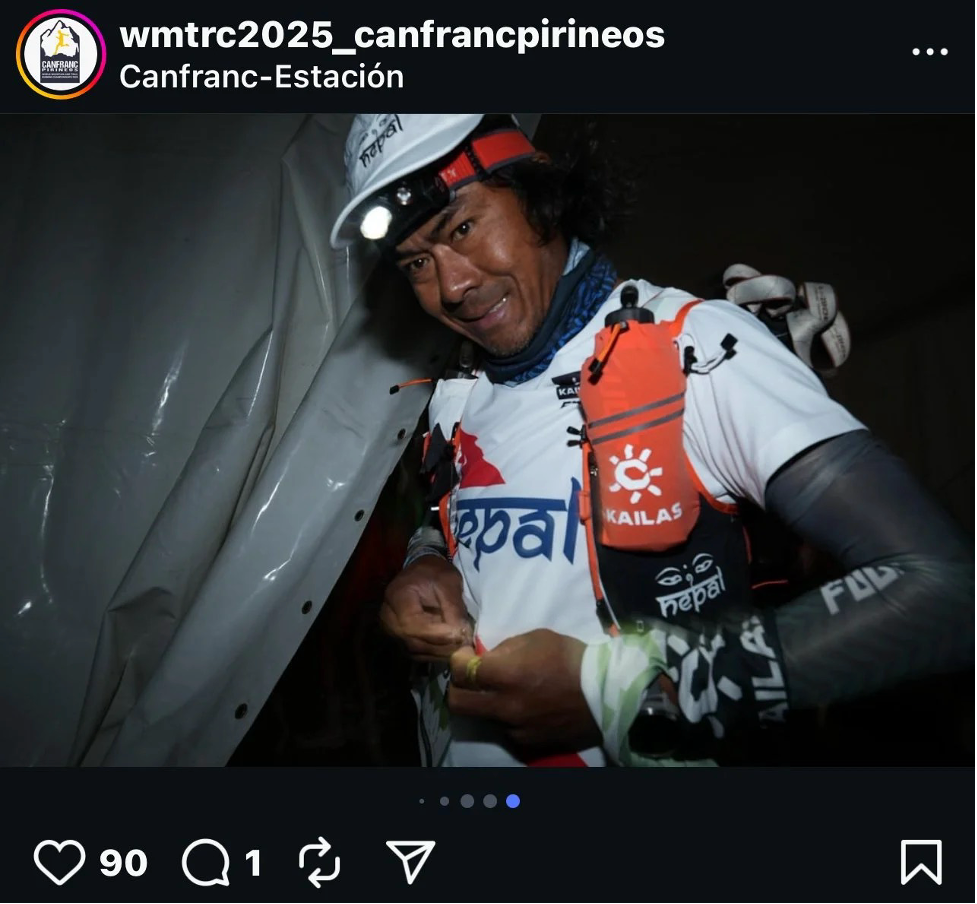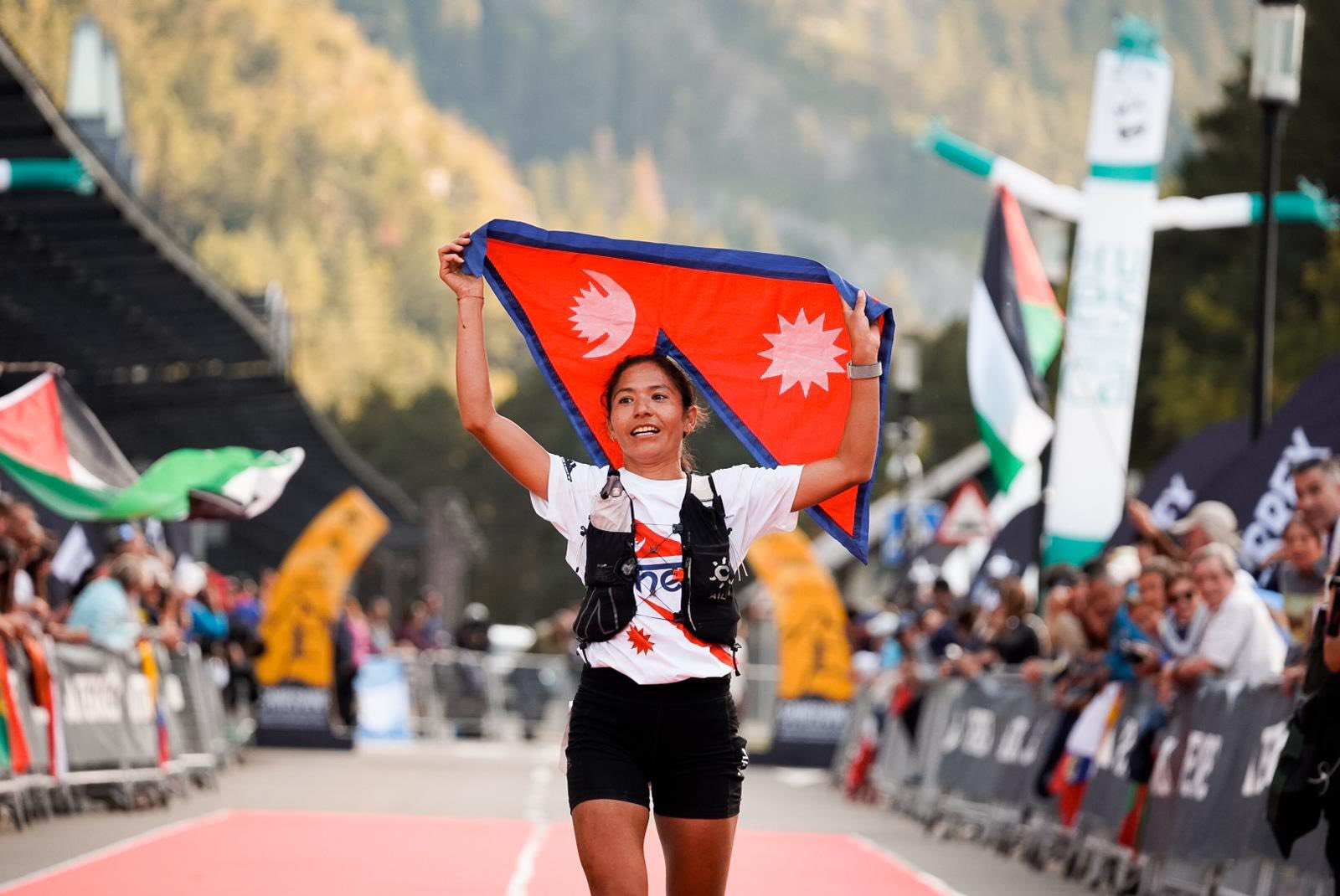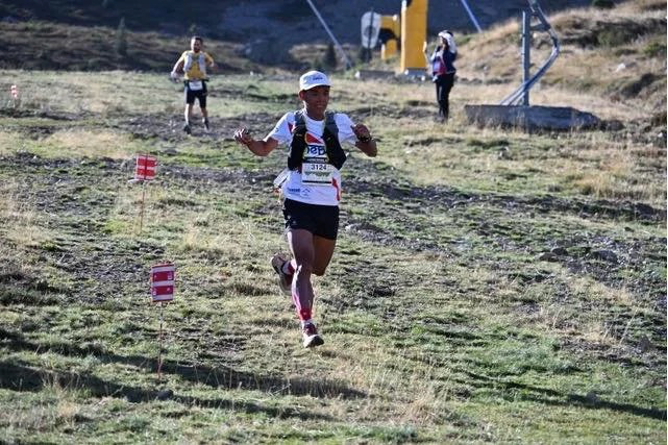Nepali runners score breakthroughs
Nepal storms the World Mountain and Trail Running Championships in SpainWhile the streets of Kathmandu were erupting violent GenZ protests that brought down the government, Nepal’s athletes were achieving different kinds of breakthroughs on Spain’s mountain trails and in the cricket qualifiers in the UAE.
On 27 September, two weeks after the uprising back home, Nepal's cricket team stunned the sporting world with their first-ever victory against a full member nation — defeating two-time World Cup champions West Indies by 19 runs, then crushing them by 90 runs two days later to seal a historic 2-0 series victory.
On that very day, 5,000km away in the Spanish Pyrenees Sunmaya Budha stood on a podium alongside American and European champions, clutching a silver medal from the 3rd World Mountain and Trail Running Championships. No Asian athlete had ever finished this high in the Long Trail competition at the World Championships.
While youth back home showed they would not tolerate injustice and could carve their own future, young Nepalis were securing it on the global sports stage even in moments of national crisis.
The Long Trail event at the 2025 World Championships was designed to break even the strongest athletes. Stretching 82km through the Spanish Pyrenees, the course features an unrelenting 5,413m of elevation gain and descent.
Athletes faced everything from steep scree slopes to narrow ridge lines, from boulder fields requiring scrambling to precipitous descents demanding total concentration. One misstep could mean injury, one lapse in focus could cost precious minutes.

WOMEN'S COMPETITION
Katie Schide (USA) - Winner
• Time: 9:57:59
• Average pace: 7:18 per km
Sunmaya Budha (Nepal) - Silver Medal
• Time: 10:23:03
• Gap behind winner: 25 minutes and 4 seconds
• Average pace: 7:36 per km
Most recreational trail runners need 18-24 hours to complete this course, if they can finish it at all. Budha's pace means she was running at a speed that most casual runners could not maintain on a flat course, let alone while constantly climbing and descending mountains.
MEN'S COMPETITION
Jim Walmsley (USA) - Winner
• Time: 8:35:11
• Average pace: 6:17 per kilometer (10:07 per mile)
Suman Kulung (Nepal) - 32nd Place
• Time: 10:06:25
• Average pace: 7:24 per km
• Finished 1 hour 31 minutes behind the winner
• Best performance by an Asian male athlete
Man Kumar Roka Magar (Nepal) - 37th Place
• Time: 10:10:53
• Average pace: 7:27 per km
• Finished just 4.5 minutes behind Kulung
Sangge Sherpa (Nepal) - 116th Place
• Time: 12:33:09
• Average pace: 9:11 per km

The men's winner averaged about 6:17/km on a course where elite mountain runners were struggling. Kulung and Roka Magar maintained a 7:24-7:27/km pace—faster than many recreational runners' easy flat road pace. They were faster than dozens of European athletes who train in the Alps.
Even Sherpa's 9:11/km average pace over 12+ hours represents an extraordinary feat of endurance, maintaining forward progress on some of the most challenging mountain terrain in competitive trail running.
“What set Budha apart was her exceptional descending ability. She recorded the fastest downhill speed among all women in the competition—a skill honed through years of training on Nepal’s steep mountain trails,” said her team director Ryan S Blair.
Sunmaya Budha, ranked world 8th for 100km category events and 17th in the world by the International Trail Running Association (ITRA), entered the race having recently recovered from injuries to both legs.

While American Katie Schide dominated from the front, Budha found herself in an intense battle for second place with Italy's Fabiola Conti, a specialised skyrace and mountain marathon runner. The two runners remained locked together through much of the course, running side-by-side at key checkpoints and pushing each other through the mountain wilderness.
In ultra-trail racing, where climbs are often win by fractions of minutes, the ability to descend fearlessly and efficiently can make the difference between podium positions. Budha's technical prowess on the descents gave her a advantage over her European competitors.
The decisive moment came in the final 20km. At the 65km mark, Budha held a 90-second lead over Conti. By 71.5km she had extended her advantage to eight minutes — a commanding gap she maintained to the finish.
In a powerful display of national pride, she approached the finish wrapped in the Nepali flag, showing the world what Himalayan athletes can achieve on the global stage.
Said Preeti Khattri, team lead for Nepal: "Standing right beside the USA and European peer. Proud. No Asian athletes have ever made it this far.”
MEN, TOO
While Budha captured headlines with her silver medal, the performances of Suman Kulung and Man Kumar Roka Magar were equally significant. Both athletes topped Asian athletes and numerous European competitors.
Suman Kulung delivered a performance that demonstrated extraordinary mental toughness and racing intelligence. What makes his 32nd place finish even more impressive is that 1.5km he encountered a severe bottleneck on narrow technical trails.
This critical delay pushed him back to around 92nd position—a devastating setback in a world championship race where every second counts. Many athletes would have been demoralised by such an early disaster.

But Kulung showed why he is Nepal's top-ranked trail runner: he launched a spectacular comeback. By the 30km mark, he had charged through the field to reach approximately 20th position — recovering over 70 places in less than 30km.
His final time of 10:06:25 placed him ahead of runners from traditional mountain running powers including Switzerland, Austria, and Germany, and was the highest-finishing Asian male athlete in the competition.




